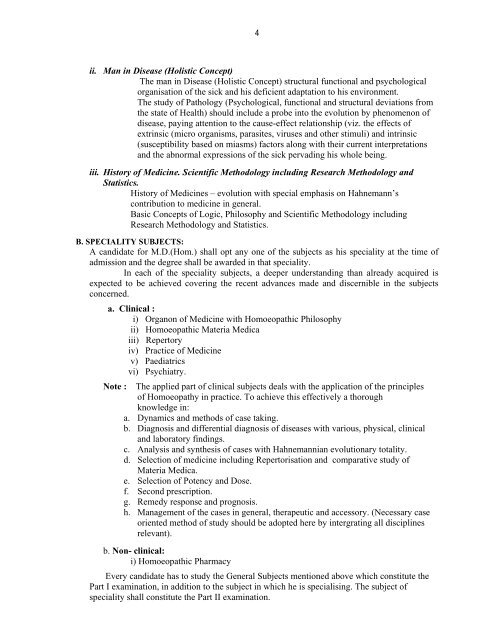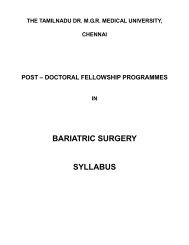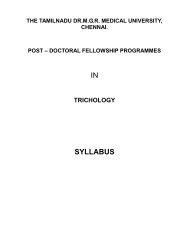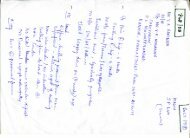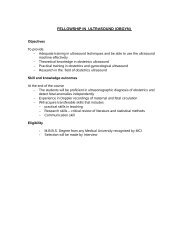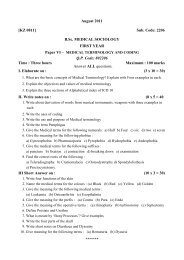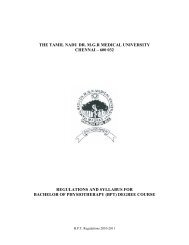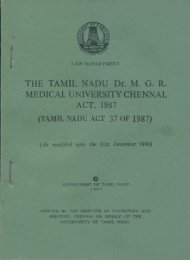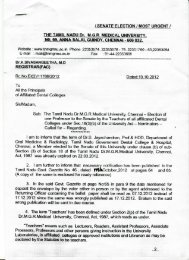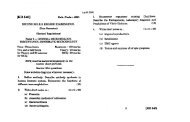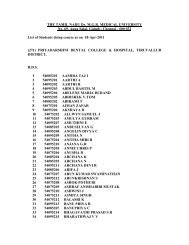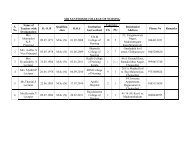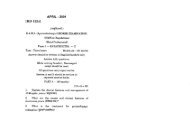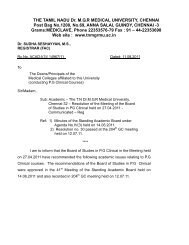M.D(Homoeopathy) - Tamil Nadu Dr. M G R Medical University
M.D(Homoeopathy) - Tamil Nadu Dr. M G R Medical University
M.D(Homoeopathy) - Tamil Nadu Dr. M G R Medical University
You also want an ePaper? Increase the reach of your titles
YUMPU automatically turns print PDFs into web optimized ePapers that Google loves.
4<br />
ii. Man in Disease (Holistic Concept)<br />
The man in Disease (Holistic Concept) structural functional and psychological<br />
organisation of the sick and his deficient adaptation to his environment.<br />
The study of Pathology (Psychological, functional and structural deviations from<br />
the state of Health) should include a probe into the evolution by phenomenon of<br />
disease, paying attention to the cause-effect relationship (viz. the effects of<br />
extrinsic (micro organisms, parasites, viruses and other stimuli) and intrinsic<br />
(susceptibility based on miasms) factors along with their current interpretations<br />
and the abnormal expressions of the sick pervading his whole being.<br />
iii. History of Medicine. Scientific Methodology including Research Methodology and<br />
Statistics.<br />
History of Medicines – evolution with special emphasis on Hahnemann’s<br />
contribution to medicine in general.<br />
Basic Concepts of Logic, Philosophy and Scientific Methodology including<br />
Research Methodology and Statistics.<br />
B. SPECIALITY SUBJECTS:<br />
A candidate for M.D.(Hom.) shall opt any one of the subjects as his speciality at the time of<br />
admission and the degree shall be awarded in that speciality.<br />
In each of the speciality subjects, a deeper understanding than already acquired is<br />
expected to be achieved covering the recent advances made and discernible in the subjects<br />
concerned.<br />
a. Clinical :<br />
i) Organon of Medicine with Homoeopathic Philosophy<br />
ii) Homoeopathic Materia Medica<br />
iii) Repertory<br />
iv) Practice of Medicine<br />
v) Paediatrics<br />
vi) Psychiatry.<br />
Note : The applied part of clinical subjects deals with the application of the principles<br />
of <strong>Homoeopathy</strong> in practice. To achieve this effectively a thorough<br />
knowledge in:<br />
a. Dynamics and methods of case taking.<br />
b. Diagnosis and differential diagnosis of diseases with various, physical, clinical<br />
and laboratory findings.<br />
c. Analysis and synthesis of cases with Hahnemannian evolutionary totality.<br />
d. Selection of medicine including Repertorisation and comparative study of<br />
Materia Medica.<br />
e. Selection of Potency and Dose.<br />
f. Second prescription.<br />
g. Remedy response and prognosis.<br />
h. Management of the cases in general, therapeutic and accessory. (Necessary case<br />
oriented method of study should be adopted here by intergrating all disciplines<br />
relevant).<br />
b. Non- clinical:<br />
i) Homoeopathic Pharmacy<br />
Every candidate has to study the General Subjects mentioned above which constitute the<br />
Part I examination, in addition to the subject in which he is specialising. The subject of<br />
speciality shall constitute the Part II examination.


